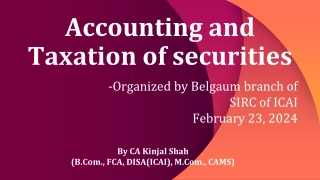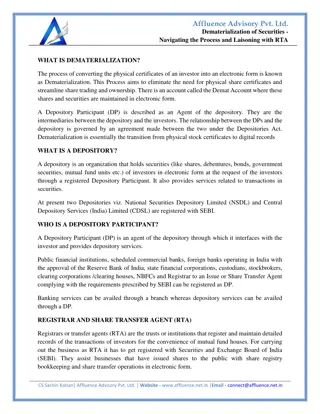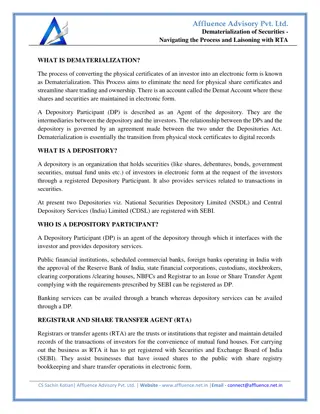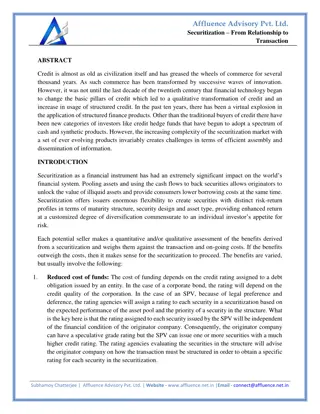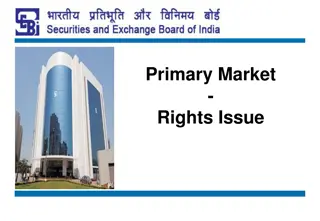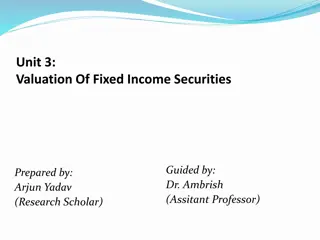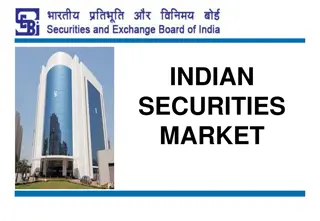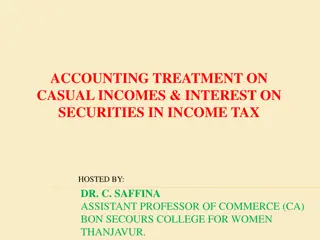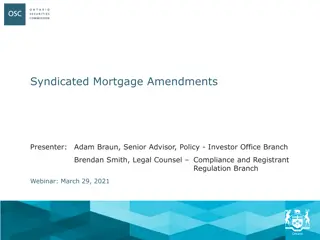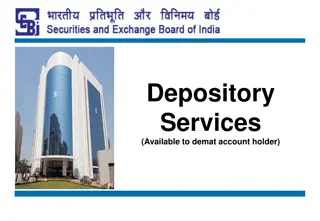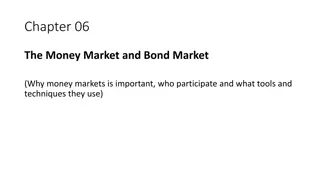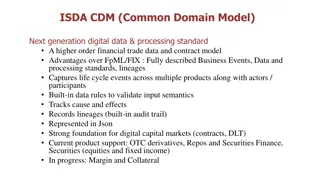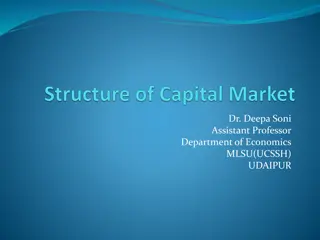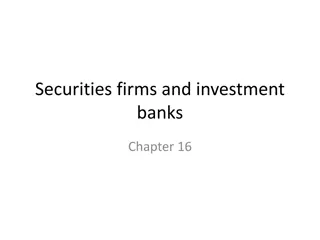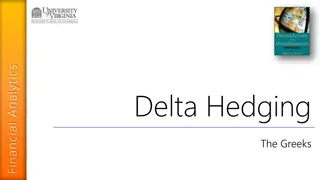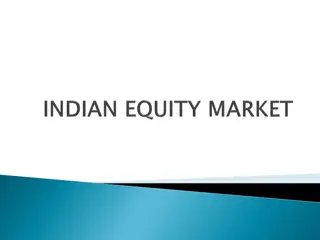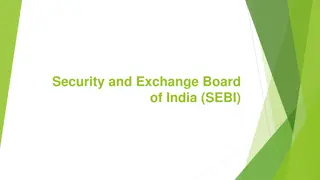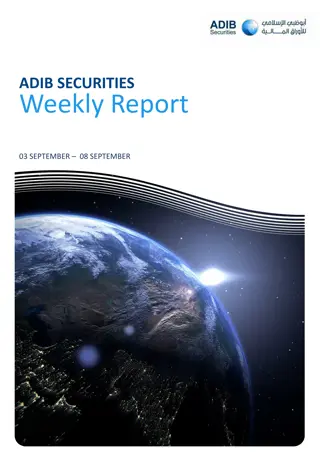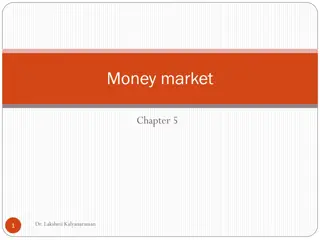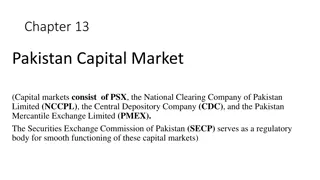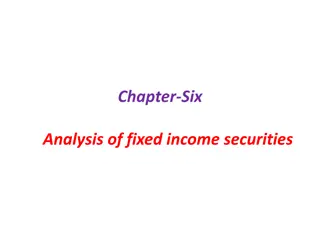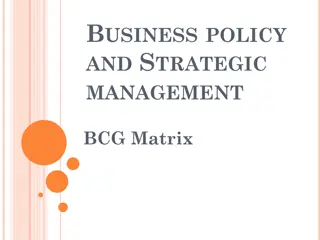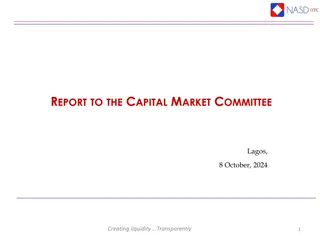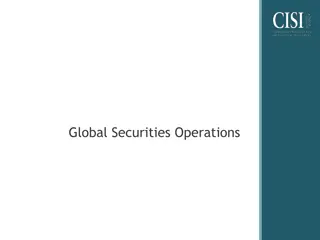Accounting and Taxation of Securities Organized by Belgaum Branch of ICAI
Explore the accounting treatment and taxation of securities in a seminar organized by the Belgaum branch of ICAI. Learn about various types of securities, their accounting principles, taxation rules, and important points through case studies and insightful discussions led by CA Kinjal Shah. Gain val
4 views • 74 slides
Lusaka Securities Exchange Q1 2024 Market Performance Overview
The Lusaka Securities Exchange (LuSE) in Q1 2024 witnessed notable market performance with Equity Market Capitalization at K97.76 billion, a 10.20% YTD increase. Quarterly media engagements support market transparency and investor confidence. Sector-wise, Retail Trading leads with 36% market capital
0 views • 18 slides
Demat of Securities -Navigating the Process and Laisoning with RTA
Dematerialization converts physical securities into electronic form, stored in a Demat account managed by a Depository Participant (DP). This process, facilitated by Registrars and Share Transfer Agents (RTAs), ensures streamlined trading and ownership. All public companies and certain private compa
0 views • 4 slides
Dematerialization of Securities -Navigating the Process and Laisoning with RTA
Dematerialization converts physical securities into electronic form, stored in a Demat account managed by a Depository Participant (DP). This process, facilitated by Registrars and Share Transfer Agents (RTAs), ensures streamlined trading and ownership. All public companies and certain private compa
0 views • 4 slides
SEBI's Role in Investor Protection and Stock Market Regulation
Securities and Exchange Board of India (SEBI) plays a crucial role in safeguarding investor interests and ensuring fair practices in the Indian stock market. By promoting transparency, enforcing regulations, and regulating market intermediaries, SEBI aims to maintain market integrity, protect invest
0 views • 23 slides
Securitization – From Relationship to Transaction
Securitization allows originators to convert illiquid assets into marketable securities, offering significant benefits like reduced borrowing costs and diversified funding sources. It provides issuers with flexibility to create securities with distin
0 views • 9 slides
Understanding Mortgage Derivatives and Risk Management
Mortgage derivatives such as Interest Only (IO) and Principal Only (PO) strips, as well as Collateralized Mortgage Obligations (CMOs), offer investors a way to manage risk more precisely than traditional mortgage-backed securities. By allowing control over interest rate and default risks, these soph
0 views • 80 slides
Understanding Primary Market Rights Issue in Securities Market
Rights issue in the primary market allows existing shareholders to purchase additional securities at a discounted price. This presentation covers the overview, types of securities offered, key terms, key documents, application processes, and allotment status. It is intended for educational purposes
0 views • 35 slides
Understanding Valuation of Fixed Income Securities
Explore the valuation process for fixed income securities like bonds with a focus on characteristics, capitalization of cash flows, and bond yields. Learn about the features of fixed income securities and how to calculate their present value based on cash flows and discount rates.
0 views • 9 slides
Overview of Indian Securities Market and SEBI
Explore the Indian Securities Market and the role of SEBI in regulating it. Learn about key concepts such as primary and secondary markets, investor rights, mutual funds, and investor grievance redressal. Understand the structure of the market and the prerequisites for buying and selling shares. Dis
0 views • 56 slides
Understanding the Significance of Capital Market in Finance
Capital Market plays a crucial role in facilitating long-term finance for companies and governments, offering avenues for investors, promoting economic growth, and ensuring stability in securities. It encompasses functions like fund mobilization, capital formation, and technological advancement. Wit
0 views • 11 slides
Accounting Treatment of Casual Incomes and Interest on Securities in Income Tax
This content discusses the accounting treatment of casual incomes and interest on securities in income tax, presented through two problems with solutions. The first problem involves computing income from other sources based on lottery winnings and betting amounts. The second problem deals with calcu
0 views • 13 slides
Understanding Marshalling of Securities in Mortgage Law
Marshalling of Securities, as per Section 81 of the Transfer of Property Act, addresses the scenario where a property owner mortgages properties to different individuals. This doctrine ensures subsequent mortgagees are entitled to have debts satisfied from properties not mortgaged to them while prot
0 views • 20 slides
Understanding Syndicated Mortgage Investments: Key Information and Regulations
Syndicated Mortgage Investments (SMIs) involve multiple lenders participating in a mortgage, with distinctions between Qualified SMIs (QSMIs) and Non-Qualified SMIs (NQSMIs). The presentation covers the definition of SMIs, requirements for QSMIs, registration processes, compliance obligations, and c
0 views • 22 slides
Understanding Dematerialisation in Securities Market
Dematerialisation is the conversion of physical securities into electronic form, making it convenient and secure for investors. This presentation covers the process, prerequisites, and steps involved in dematerialising securities, along with examples of securities that can be dematerialised. It also
1 views • 39 slides
Listing of Securities in Stock Exchange: Requirements and Obligations
Understanding the process of listing securities in a stock exchange involves fulfilling specific conditions before listing, such as offering shares to the public and having a broad-based capital structure. Obligations post-listing include paying annual listing fees, complying with exchange regulatio
1 views • 12 slides
Understanding Buyback of Securities and Open Offer of Shares
Buyback of securities is a corporate action where a company repurchases its own shares from existing shareholders, opposite of a public issue. Common reasons include returning surplus cash to shareholders, improving return on equity, and enhancing earnings per share. Conditions for buy-back include
0 views • 32 slides
Understanding the Importance of Money Markets and Bond Markets
Money markets play a crucial role in the financial system by providing short-term, low-risk, and liquid investment options. Participants include institutional investors and dealers who engage in large transactions. Money market securities have specific characteristics, such as large denominations, l
0 views • 23 slides
Next Generation Digital Data and Processing Standard in Financial Trade
ISDA CDM (Common Domain Model) presents a higher-order financial trade data and contract model with advantages over FpML/FIX. It offers fully described business events, data, and processing standards, capturing life cycle events across various products along with participants. The model includes bui
0 views • 4 slides
Overview of Indian Capital Market and Financial Institutions
The Indian Capital Market comprises securities market and financial institutions, facilitating the trading of government securities, industrial securities, and providing medium to long-term funds. Financial intermediaries like merchant bankers, mutual funds, and venture capital companies contribute
0 views • 5 slides
Role of Securities Firms and Investment Banks in Financial Markets
Securities firms and investment banks play a vital role in facilitating the transfer of funds between suppliers and users in financial markets with efficiency and low costs. Investment banks assist businesses and governments in raising funds through securities issuance, while securities firms aid in
0 views • 26 slides
Key Changes in Securities Investment Business Law, 2019 for Investment Managers
Amendments to the Securities Investment Business Law in 2019 introduce important changes for Excluded Persons, requiring registration and compliance with regulatory frameworks. Registered Persons face stricter information requests, director appointment rules, and fit and proper person assessments un
0 views • 8 slides
Understanding Capital Market and Its Significance
Capital market refers to the market for long-term finance where financial assets like Shares, Debentures, and Bonds are traded. It plays a vital role in mobilizing funds for companies and governments, facilitating capital formation, and promoting economic growth. The classification includes Industri
0 views • 11 slides
Understanding the Primary Market and Its Functions
The primary market, also known as the new issue market, is where industrial securities are issued for the first time to the public. It plays a crucial role in mobilizing savings and channelizing them for productive purposes. Through processes like IPOs and FPOs, companies raise capital for various n
0 views • 7 slides
Private Placement of Securities: Overview and Methods to Raise Capital
Private placement of securities involves offering securities to a select group of investors by a company, excluding public offering. This presentation covers the meaning of private placement, provisions of law, methods to raise capital through private placement, and understanding the Private Placeme
3 views • 16 slides
Understanding Delta Hedging Techniques in Finance
Explore the concept of delta hedging as a premier technique in finance, illustrated through examples of long and short stock positions, profit curves, and the process of manually hedging a position by counterbalancing price changes with options. Learn how delta hedging helps in determining the right
0 views • 18 slides
Overview of Insider Trading Laws and Notorious Cases
Insider trading, involving the trading of securities based on confidential information, is prohibited under various statutes such as Section 10(b) of the Securities Exchange Act of 1934 and SEC Rule 10b-5. The Insider Trading Sanctions Act of 1984 and the Insider Trading and Fraud Act of 1988 provid
0 views • 24 slides
Understanding the Primary Market in Corporate Finance
Every company needs funds for short-term or long-term requirements, which can be met through sources like banks or the primary market. The primary market is where securities are purchased directly from the issuer, offering new securities to investors. This market helps in raising long-term capital f
0 views • 25 slides
Overview of the Securities and Exchange Board of India (SEBI)
The Securities and Exchange Board of India (SEBI) was established in 1992 to regulate and promote the development of the securities market. SEBI aims to protect investor interests, prevent malpractices, and ensure a fair and transparent market. Through its objectives, SEBI plays a crucial role in re
0 views • 5 slides
The Rise and Fall of Bernard Madoff and His Securities Firm
Bernard Lawrence Madoff, a former prominent figure in high finance, founded Madoff Securities and revolutionized the securities market. However, his firm's success was built on a fraudulent scheme that collapsed in 2008, causing immense losses to investors.
0 views • 20 slides
ADIB Securities Weekly Report - Global and Local Market Snapshot
ADIB Securities weekly report provides insights into the international and MENA indices weekly changes, including the performance of global indices like Dow Jones, Nasdaq, and regional indices like Saudi SE, DFM, and more. The report also covers commodity price changes, regional news highlights from
0 views • 4 slides
The Role and Purpose of Securities and Exchange Board of India (SEBI)
Established in 1988 by the Government of India, Securities and Exchange Board of India (SEBI) plays a crucial role in regulating the securities market. SEBI aims to promote investor protection, ensure fair practices, and facilitate efficient resource mobilization. By monitoring and enforcing regulat
0 views • 15 slides
Understanding Money Market Instruments and Yields
Money market instruments are short-term debt securities with high liquidity, low risk, and issued by high-quality borrowers. These instruments offer a higher return than cash holdings, making them attractive for investors. Bond equivalent yields provide a way to compare different types of securities
0 views • 30 slides
Overview of Pakistan Capital Market and Securities Exchange Commission
Pakistan's capital market consists of PSX, NCCPL, CDC, and PMEX, regulated by SECP. SECP was established in 1999 to regulate the corporate sector, insurance companies, and non-banking finance companies. The Securities and Exchange Policy Board provides guidance, while the Commission oversees operati
0 views • 17 slides
Introduction to Security Types in Financial Markets
This chapter provides an overview of different types of securities traded in financial markets worldwide. It covers classifications of financial assets, including money market instruments, fixed-income securities, equities, futures, and options. The focus is on interest-bearing assets, such as Treas
0 views • 21 slides
Understanding Fixed-Income Securities for Investment
Fixed-income securities offer fixed returns up to a redemption date or indefinitely, comprising long-term debt securities and preferred stocks. These investments involve various risk factors, including default risk. Long-term debt securities, such as bonds, provide a safe asset but require careful c
0 views • 47 slides
Understanding BCG Matrix: Market Growth and Relative Market Share
BCG Matrix, developed by Bruce Henderson of the Boston Consulting Group, categorizes business units into Question Marks, Stars, Cash Cows, and Dogs based on market growth and relative market share. Market share and market growth are crucial factors in determining a company's position in the market.
0 views • 31 slides
Difference Between Capital Market and Money Market: A Comprehensive Overview
The capital market and money market serve different purposes in the financial world. While the capital market provides funds for long-term investments in securities like stocks and debentures, the money market deals with short-term borrowing and lending of funds. The capital market acts as a middlem
0 views • 4 slides
Achieving Liquidity Through Transparent Market Operations in Lagos - Capital Market Committee Report
This report dated 8th October 2024 sheds light on the efforts and progress made in creating liquidity transparently in the market. It covers key aspects such as admitted securities, share capital, dematerialization, trade volume, market leaders, and initiatives for market expansion and enhancement.
0 views • 11 slides
Comprehensive Guide to Global Securities Operations
Explore the world of global securities operations through this detailed guide, covering topics such as course outlines, study plans, exam preparation, taking the exam, securities investment, and ordinary shares. Gain insights into how securities investment firms operate, the role of investment banks
0 views • 102 slides
